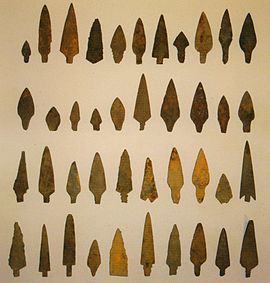Battle of Cieneguilla
| Battle of Cieneguilla | |||||||
|---|---|---|---|---|---|---|---|
| Part of the Jicarilla War, Apache Wars, Ute Wars | |||||||
 Metal points from the Cieneguilla Battle Site. |
|||||||
|
|||||||
| Belligerents | |||||||
|
Apache Ute |
|
||||||
| Commanders and leaders | |||||||
| Flechas Rayada | John W. Davidson | ||||||
| Strength | |||||||
| 200 to 300 warriors | 60 cavalry | ||||||
| Casualties and losses | |||||||
| 50 killed | 22 killed 36 wounded |
||||||
The Battle of Cieneguilla (pronounced sienna-GEE-ya; English: small swamp) was an engagement of the Jicarilla War involving a group of Jicarilla Apaches, their Ute allies, and the American 1st Cavalry Regiment on March 30, 1854 near what is now Pilar, New Mexico. The Santa Fe Weekly Gazette reported that the action "was one of the severest battles that ever took place between American troops and Red Indians." It was one of the first significant battles between American and Apache forces and was also part of the Ute Wars, in which Ute warriors attempted to resist Westward expansion in the Four Corners region.
Companies F and I, regiment of the First Dragoons camped at Cantonment Burgwin, an army post 10 miles southeast of Taos. While on patrol, 60 dragoons engaged in an unauthorized attack on the Jicarilla Apache encampment near Pilar, then known as Cieneguilla, after First Lieutenant John Wynn Davidson exceeded the orders of his superior officer, Major Blake.
A combined force of about 250 Apaches and Utes laid an ambush for the U.S. dragoons. In his report two days after the battle, Davidson stated that "[He] came upon the Apaches near Cieneguilla who at once sounded the war whoop." According to Private James A. Bennett (aka James Bronson), a sergeant who survived the ambush, the battle lasted about four hours. It started around 8 a.m. and ended when the dragoon regiments retreated at 12 p.m. to Ranchos de Taos. The Apache warriors used flintlock rifles and arrows. Of the 60 dragoons present, the U.S. suffered twenty-two killed and a further thirty-six wounded, along with a loss of twenty-two horses and much of the troops' supplies.
...
Wikipedia
